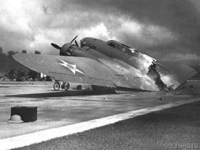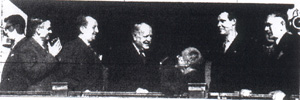Over Here, Over There
Introduction | Perception
of the Enemy | News of
the War | Keeping
in Contact | Re-entry
into the Community | Notes | Main
Index
News of the War
Because the war was fought hundreds of miles away and contact with individuals
abroad was limited and sluggish, Americans at home relied on the news media
for wartime developments. Unlike today's instant and varied information options,
the radio, the newspapers and the occasional newsreel at the opening of a movie
constituted the main media for information in the 1940s.
 The
federal government strictly controlled and in many cases censored images and
reports they believed would damage American morale or support for the war effort.
In June 1942 the federal government created the Office of War Information "to
coordinate dissemination of war information by federal agencies and to carry
out, by means of the press, radio and motion pictures, programs designed to
facilitate an understanding of the war effort and of the policies, activates
and aims of the Government." (7)
Although this office of the executive branch was only funded for two years,
it was successful in consolidating wartime data and releasing its interpretation
of the facts to domestic news bureaus.
The
federal government strictly controlled and in many cases censored images and
reports they believed would damage American morale or support for the war effort.
In June 1942 the federal government created the Office of War Information "to
coordinate dissemination of war information by federal agencies and to carry
out, by means of the press, radio and motion pictures, programs designed to
facilitate an understanding of the war effort and of the policies, activates
and aims of the Government." (7)
Although this office of the executive branch was only funded for two years,
it was successful in consolidating wartime data and releasing its interpretation
of the facts to domestic news bureaus.
Despite curtailing the freedom of the press, the Villagers with whom we spoke
regarded the newspaper and radio as the most important ways in which those at
home could remain engaged in the War.
"The Worcester Telegram and Gazette" was the newspaper many Village
residents turned to for daily updates about the war. "The newspapers had
everything you could, you know, want out of it, and ah, it kept everybody on
top of everything," remembers Gordon
Forsberg. It was very important for all Americans to stay abreast of any
war developments, as the war dominated conversation on the home front.
It is interesting to note that none of the Quinsigamond residents whom we interviewed
had any distinct memories of the local newspaper headlines. It is difficult
to ascertain if this is representative of the rest of the country. A possible
reason for the lack of identification with the "Gazette" could be
the relative geographic isolation of the Village from the rest of the community.
Likewise, the vilalgers, many of whome were native Swedes may have found listening
to the radio easier than reading English. Another possible explanation could
be the dominance of the radio over the entire country.
Radio broadcasting, what historian John Morton Blum calls"the most influential
medium of the time," brought the news from abroad home to Quinsigamond
residents. (8) Forsberg
still remembers the daily news bulletins: "then of course you have the
news bulletin, was, you know, one o'clock or I think noon, from 12 to 1, they
had all of the great commentators and all of that, and they kept you pretty
much up on it." News commentators, such as Edward R. Murrow who was based
in London, described in great detail the battles in Europe to the American public.
He attempted to impart vivid images to his audience, however words are never
as disturbing as photographs or film. Listeners were still left to create their
own images.
 During
this era, the radio had other distinctive voices such as Lowell Thomas and Gabriel
Edith. Thomas, the first reporter to enter war-torn Germany after WWI, became
a household name. Edith often delivered his news updates from a news truck just
a few miles behind the front line. (9)
While this kind of straight news reporting was informative, some village residents
found it could be somewhat insensitive to Americans at home. Whipple Street
resident Florence Ingman,
whose husband was overseas at the time of the War, was particularly troubled
with Edith's broadcasts: "And of course, my father would say, 'Of course,
we've gotta turn on Gabriel Edith.' 'It's bad.' How would you like to hear this?
'Bad out there tonight.' 'Such and such an army,' I'll say the Seventh Army,
'is fighting, uh, and they've lost,' and then he'd mention how many people had
been lost, and uh, and then you heard about the Battle of the Bulge, and all
this. Sure, this was scary listening to this on the radio." For Ingman,
Edith's direct reporting style brought the war too close to home.
During
this era, the radio had other distinctive voices such as Lowell Thomas and Gabriel
Edith. Thomas, the first reporter to enter war-torn Germany after WWI, became
a household name. Edith often delivered his news updates from a news truck just
a few miles behind the front line. (9)
While this kind of straight news reporting was informative, some village residents
found it could be somewhat insensitive to Americans at home. Whipple Street
resident Florence Ingman,
whose husband was overseas at the time of the War, was particularly troubled
with Edith's broadcasts: "And of course, my father would say, 'Of course,
we've gotta turn on Gabriel Edith.' 'It's bad.' How would you like to hear this?
'Bad out there tonight.' 'Such and such an army,' I'll say the Seventh Army,
'is fighting, uh, and they've lost,' and then he'd mention how many people had
been lost, and uh, and then you heard about the Battle of the Bulge, and all
this. Sure, this was scary listening to this on the radio." For Ingman,
Edith's direct reporting style brought the war too close to home.
Radio and print media played an important role both for the government and
for Americans on the home front. The government needed to perpetuate support
for the costly war and succeeded in doing so, in part, by controlling the flow
of information to the American public. Had many of the graphic images that are
so often associated with war today been publicized, one wonders whether such
blanket approval of the war effort would have existed. The American public relied
on this information to make the foreign war a reality and also to keep them
in contact with friends and family abroad.

 The
federal government strictly controlled and in many cases censored images and
reports they believed would damage American morale or support for the war effort.
In June 1942 the federal government created the Office of War Information "to
coordinate dissemination of war information by federal agencies and to carry
out, by means of the press, radio and motion pictures, programs designed to
facilitate an understanding of the war effort and of the policies, activates
and aims of the Government." (7)
Although this office of the executive branch was only funded for two years,
it was successful in consolidating wartime data and releasing its interpretation
of the facts to domestic news bureaus.
The
federal government strictly controlled and in many cases censored images and
reports they believed would damage American morale or support for the war effort.
In June 1942 the federal government created the Office of War Information "to
coordinate dissemination of war information by federal agencies and to carry
out, by means of the press, radio and motion pictures, programs designed to
facilitate an understanding of the war effort and of the policies, activates
and aims of the Government." (7)
Although this office of the executive branch was only funded for two years,
it was successful in consolidating wartime data and releasing its interpretation
of the facts to domestic news bureaus. 
 During
this era, the radio had other distinctive voices such as Lowell Thomas and Gabriel
Edith. Thomas, the first reporter to enter war-torn Germany after WWI, became
a household name. Edith often delivered his news updates from a news truck just
a few miles behind the front line.
During
this era, the radio had other distinctive voices such as Lowell Thomas and Gabriel
Edith. Thomas, the first reporter to enter war-torn Germany after WWI, became
a household name. Edith often delivered his news updates from a news truck just
a few miles behind the front line. 